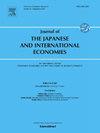政治冲突与愤怒的消费者:评估消费者抵制对旅游服务贸易的区域影响
IF 3.1
3区 经济学
Q1 ECONOMICS
Journal of the Japanese and International Economies
Pub Date : 2022-09-01
DOI:10.1016/j.jjie.2022.101216
引用次数: 2
摘要
国家之间的政治冲突有时会导致消费者的抵制。我们通过调查2019年韩国消费者抵制日本旅行的情况,来研究双边抵制活动的区域影响。采用三重和双重差异设计,我们发现抵制的影响是巨大的,区域异质性。抵制前对韩国游客依赖度较高(即第75百分位)的日本地区,双边出口损失达56.9% ~ 60.9%,总出口损失达10.5% ~ 13.3%。对韩依赖度较低的地区(即第25百分位)的双边损失为47.8%至49.7%,总损失为3.3%至4.2%。本文章由计算机程序翻译,如有差异,请以英文原文为准。
Political conflict and angry consumers: Evaluating the regional impacts of a consumer boycott on travel services trade
Political conflict between nations sometimes leads to consumer boycotts. We examine the regional impacts of bilateral boycott activity by investigating the 2019 Korean consumer boycott of travel to Japan. Employing triple- and double-differences designs, we find that the impact of the boycott is large and regionally heterogeneous. Japanese prefectures with high (i.e., 75th percentile) pre-boycott dependency on visitors from Korea suffer bilateral export losses of 56.9 to 60.9 percent and aggregate export losses of 10.5 to 13.3 percent. Prefectures with low (i.e., 25th percentile) Korea dependency experience bilateral losses of 47.8 to 49.7 percent and aggregate losses of 3.3 to 4.2 percent.
求助全文
通过发布文献求助,成功后即可免费获取论文全文。
去求助
来源期刊
CiteScore
5.10
自引率
6.90%
发文量
36
期刊介绍:
The Journal of the Japanese and International Economies publishes original reports of research devoted to academic analyses of the Japanese economy and its interdependence on other national economies. The Journal also features articles that present related theoretical, empirical, and comparative analyses with their policy implications. Book reviews are also published.

 求助内容:
求助内容: 应助结果提醒方式:
应助结果提醒方式:


